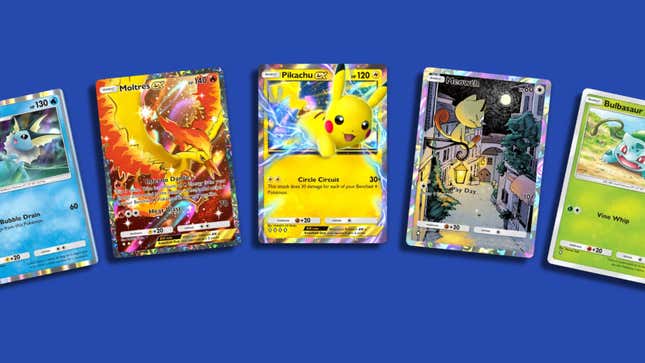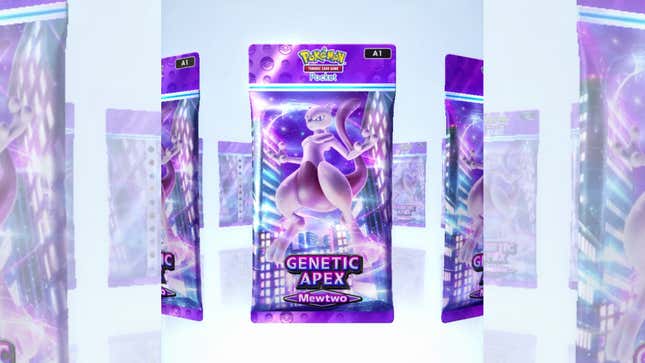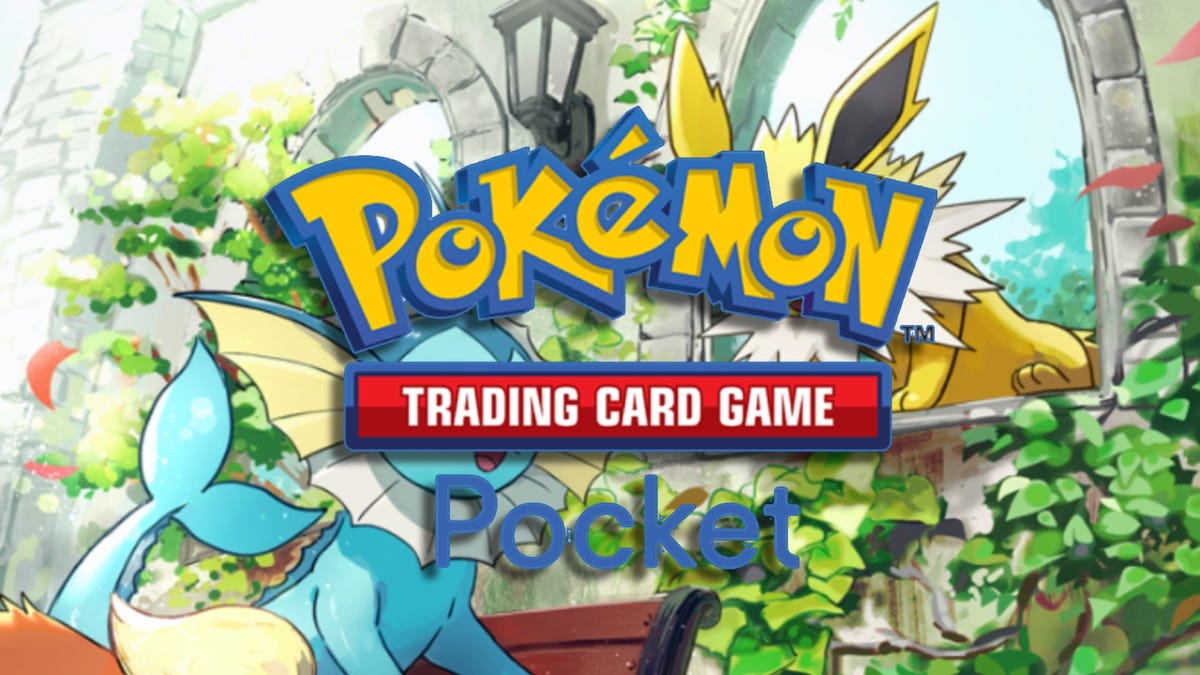There is a way to play the Pokémon TCG on your phone or tablet that is entirely free. Not “free-to-play,” but “free to leave it with your kid and not ever worry.” While it’s not the world’s best piece of software, Pokémon TCG Live is an application that lets you play the full-size, 60-card deck version of the trading card game for an unlimited amount of time and doesn’t feature a single way to pay money. Cards are added to the game using the code cards that come as an extra in physical Pokémon card packs, but they can also be bought in their hundreds for cents from various websites and stores (I throw them in the recycling in stacks), but that’s the end of any expenses. Even if you wanted to, there’s no way to add your bank card to purchase even the silliest of cosmetics. And when it comes to Pokémon, that feels right.
Pokémon TCG Pocket contains, at my last count, twelve different in-game currencies. This stripped-down, 20-card deck version of the game is a masterclass in gacha (gambling) game design, feeding you handfuls of each currency when you first begin playing, teaching you all the gameplay loops they allow, and then—right when it’s all becoming natural—cuts you off, hard. Here, the only way to add new cards to your deck is to engage with systems that endlessly encourage you to spend real-world money within the app, on top of an array of other systems that peter out just before you’re done, unless you fork out. And when it comes to Pokémon, that feels wrong.
I’m a fool, but not that big of a fool. I get why free-to-play mobile games are designed to encourage their users to spend money. These products are not charities, they’re businesses, and this is a model that has proven to be enormously lucrative. Exploitative, controversial, and in some countries even illegal, but undeniably successful. My issue here, specifically, is that this is Pokémon doing it.
The Highest Grossing (Out)
Pokémon is the highest-grossing media franchise in the world. In fact, it’s not even close. Estimated to have brought in $150 billion in its 30 years, it leaves second place Hello Kitty in its wake, with a total of $89 billion. Star Wars sits at less than half, at $70 billion, despite a 20-year head-start. If you want to compare it to the video games world, the next largest property is Mario at a measly $57 billion. There’s a reason this property, primarily focused on children and those who loved it as children, can afford to run TCG Live for free. And, of course, this total was estimated before The Pokémon Company ever dipped its toes in the toxic waters of gacha gaming. What I’m saying is, while any corporation always wants infinitely more money, Pocket isn’t a last-gasp attempt to survive from a struggling business. It’s not an essential move to calm bailing shareholders. It’s just a pure act of astonishing greed aimed at children.
Read More: Pokémon Fan Calculates How Long It Will Take To Collect Every Card In TCG Pocket
There’s a version of Pocket that could have existed and would have made sense from The Pokémon Company, co-owned by Nintendo, Creatures Inc., and Game Freak. It’s a stripped-down, Marvel Snap-like card game with an option to pay for a battle pass. And that’s it. It’d make a fortune. As it is, this new app offers a Premium Pass that looked like it was going to be a battle pass equivalent for a rather pricey $10 a month. It’s there. Beyond that, all the other systems could have been powered by in-game actions. It’d be a great solution for an IP aimed at kids, while also loved by adults; like Fortnite, if your kid really gets into it, buy them a Premium Pass to enjoy it even more. Buy yourself one. Go wild.
Instead, what we really have is an app that’s been built from the ground up to exploit its players, building gambling loops where real-world money can be spent on opening sealed packs in the hope of scoring rare rewards.
This is no better underlined by the game’s only imposed limit on spending, which it says will prevent players from using more than 750 Poké Gold a day to open packs. That amount of Gold would cost $120 per day. That’s where this app draws the line. And there are no options to add your own personalized spending limits to help protect those prone to overspending or getting hooked—surely the most basic good-faith offering that should be in place.
From training to draining

Yes, there is absolutely and unequivocally a legitimate way to enjoy Pocket without spending any money. The early waterfall of in-game currencies is enough to unlock yourself enough cards to start building rudimentary decks, and the so-called Wonder Picks and 12-hourly free packs mean you always have a way to gain more. With these, you can take part in the game’s battles against the CPU or other players, and while crude, it’s a reasonably enjoyable game. (It’s impossible not to add that if you’re used to the full version of the TCG, it’s oddly frustrating to have such a repetitive deck, no Stadium cards, and so few Trainers and Tools.) So yes, it is possible to play Pocket for free. It’s just that’s clearly not what’s intended.
In fact, to even be able to access the battles, you’re forced to go through all of the loops that’ll eventually be suggesting you pay real money. You must go through tutorials that have you opening pack after pack after pack, picking Wonder Picks, and displaying your favorite cards for others before the tab to take part in battles unlocks. Even then, you’re dragged through an unskippable series of tiny tutorials, where with each step you complete you just so happen to be rewarded more of those Pack Hourglasses that reduce the time before you can open another pack.
You’re then given all these Missions–small tasks to complete of an incidental nature, some triggered by competing in battles–that thrust more hourglasses upon you! You’ve now got over 150! That’s like 12 more packs to open! And woah, opening those packs triggered more missions and you’ve got another 40 hourglasses! Three more packs and a few hourglasses to spare! And don’t forget to Wonder Pick! That one-in-five chance of getting a card you half-want unlocks even more rewards right now! Oh, and what’s this, there’s a new type of CPU battle, where you can win the chance to try to pull a Lapras card! And it rewards you yet another type of hourglass to keep trying! Until it doesn’t!
But this is Pokémon
I keep hearing the voice of the frustrated reader, crying, “Yeah, but it’s a free-to-play app, dumbass. This is what they do.” And I just keep coming back to the same reply: Yeah, but this is Pokémon.
I think the Fortnite comparison is a useful one, here. Fortnite is indisputably another product aimed at getting parents to pay unfathomable amounts of money to play a free game. It makes billions of dollars a year, despite being even more blatantly open to being played for free, with its in-game currency sold on plastic cards in every grocery store. My son got piles of V-bucks for his recent birthday, and I pay for his Battle Pass. I’m acutely aware of how well it works. And yet, as problematic as so much of it may be, it’s nothing compared to Pokémon TCG Pocket.
In Fortnite, there’s nothing on which you can spend real-world money that affords you any advantages. Everything that can be bought is cosmetic, even in the Battle Pass. And that Battle Pass? It lasts 12 weeks (roughly three months) and costs around $9.50. For this, you get regular (cosmetic) rewards for an enormous 200 levels. You get loads, and cannot pay to win.
In Pokémon TCG Pocket, real-world money can buy you access to vastly more packs of cards, Wonder Picks, and turns at Events, all of which can give you significant advantages in the battles. The better your cards, the better your decks, and the more you’ll win. And that Premium Pass? It lasts just one month and costs $10. For this, you get a series of tasks that unlock you…11 Pack Hourglasses, eight Wonder Hourglasses, and 29 “Premium Tickets,” that let you buy a bunch of cosmetics. That’s right—11 of the items anyone wants, less than half as many as you’ll be given for completing a rudimentary mission in your opening hours of the game. Completing everything it offers takes a couple of hours, at most, and then it just sits fallow. You also get one extra pack to open a day, which is really what you’re paying for here. You get so little, and you’re paying to win.
It’s no surprise that Pokémon TCG Pocket hasn’t even tried to launch in Belgium, where loot boxes are outlawed, and nor in the Netherlands, where a similar law is being sought.
The Wooloo are gambling

As a fan of the real-world TCG, I was excited to play this streamlined version, especially after playing it at Gamescom earlier this year. At that preview demo, we weren’t shown any of the gacha elements, and questions about them were responded to with, “We’ll have to get back to you on that.” I said at the time that I feared many more ways to spend Gold other than speeding up pack opening would be revealed by launch, adding, “Gacha plus kids makes me uncomfortable.” But I still let myself hope a bit. It’s Pokémon, right?
And yes, let’s address the problematic nature of those real-world card packs too. Are they gambling? Very probably, depending on the motivation behind buying them. However, there’s a huge difference for children’s minds in something like a stamina meter that could be refilled with the touch of a button to maintain a feedback loop, and nagging your parent into taking you to the store to buy another $5 pack.
I feel very sure that in Pokémon TCG Pocket, The Pokémon Company has made a big error in judgment. While it already is proving enormously successful (with reports of $20 million made in its first week), the reputational harm that I suspect will follow could outweigh it. I foresee mainstream news stories about kids who’ve spent thousands on cards via their parents’ credit cards, alongside the more specialist press reporting on just how grim the pull rates are when you don’t spend money. Already, the man behind the deeply influential Pokémon news site Serebii, Joe Merrick, has tweeted, saying of the current Lapras event, “It took…10 Pikachu, 8 Clefairy, 6 Mankey and 5 Butterfree. A total of 29 packs before I finally got the Lapras. Now to not touch this event again.”
After this first week of people experiencing Pokémon TCG Pocket’s initial dopamine rush of endless packs to tear open, and the flow of rewards feeding into satisfying loops, I think we will now see the game’s huge audience collectively hitting the cut-off point, the moment when the dealer suddenly ups his prices now that the drug is in your system. I think it’s going to be reputationally ugly for The Pokémon Company, and I suspect the absolutely god-awful Premium Pass is going to need massive revision ASAP, likely with a heavy dump of apologetic in-game rewards for purchasers (something problematic in itself).
Yes, once again, this sort of shit is grimly normal in the mobile space, and there’s a vast industry built around the exploitation of whales in free-to-play gacha gaming. Or, let’s call it by its name: gambling. But, yet again, this is Pokémon. It’s Pokémon just undeniably selling gambling to children.
.

